
Topics
Guests
- Scott HortonNew York attorney specializing in international law and human rights. He is also a legal affairs contributor to Harper’s magazine, where he writes the blog No Comment. He served as chair of the Committee on International Law at the New York City Bar Association.
On Capitol Hill, a House subcommittee heard the testimony of Vice President Dick Cheney’s chief of staff David Addington and former Justice Department attorney John Yoo. Addington and Yoo are said to have been instrumental in developing the administration’s torture policy. We play highlights of the hearing and get analysis with attorney Scott Horton. [includes rush transcript]
Transcript
JUAN GONZALEZ: The American Civil Liberties Union and the National Lawyers Guild are calling on the US government to appoint an independent prosecutor to investigate the military and CIA’s use of torture. The calls were made yesterday on the International Day in Support of Victims of Torture.
Meanwhile, on Capitol Hill, a House subcommittee heard the testimony of Vice President Dick Cheney’s chief of staff David Addington and former Justice Department attorney John Yoo. Addington and Yoo are said to have been instrumental in developing the administration’s torture policy. Congresswoman Debbie Wasserman Schultz of Florida questioned David Addington about his role at Guantánamo.
REP. DEBBIE WASSERMAN SCHULTZ: A JAG attorney in Guantánamo, Diane Beaver, is quoted in a Vanity Fair article as saying that the message from you and the other visitors was “do whatever needed to be done.” And just weeks after that visit, interrogators at Guantánamo Bay began developing a far harsher interrogation program than they had ever used before. Did you visit Guantánamo Bay in September of 2002, as has been reported?
DAVID ADDINGTON: I don’t remember the exact date, but I went there a number of times.
REP. DEBBIE WASSERMAN SCHULTZ: Well, do you recall going to Guantánamo Bay around that time?
DAVID ADDINGTON: I really don’t remember the dates, ma’am, but I remember going in the same year —
REP. DEBBIE WASSERMAN SCHULTZ: How many times did you go to Guantánamo Bay during that period?
DAVID ADDINGTON: During that —- well, I’m not sure what period you’re describing. I’d say I’ve probably been to Guantánamo, I guess, maybe five times? First time would have been years ago, which isn’t relevant to this, when I worked at the Department of Defense. And then I’ve probably been, I would guess, three or -—
REP. DEBBIE WASSERMAN SCHULTZ: On one of those trips, did you meet with JAG attorneys?
DAVID ADDINGTON: I didn’t recall it. I remember when Ms. Beaver, Colonel Beaver, who was referenced, I think, in Mr. Sands’s Vanity Fair article — I did not remember meeting her there. The only time I remember meeting her is over at the Office of General Counsel of the Department of Defense many years later.
REP. DEBBIE WASSERMAN SCHULTZ: What generally prompted your trips to Guantánamo Bay when you made them?
DAVID ADDINGTON: I was invited by the Department of Defense to go and accepted. I thought it would be good to go and see what they were doing to implement the decisions made in January and February at the White House to have detainees held there by the Department of Defense.
REP. DEBBIE WASSERMAN SCHULTZ: Did you have any discussions on those trips about interrogation methods?
DAVID ADDINGTON: I don’t know about methods. I would say we probably did, only in the sense I can remember —- and I’m not sure it’s this particular trip, at least on some of the trips, and it may have been -—
REP. DEBBIE WASSERMAN SCHULTZ: On any of the trips?
DAVID ADDINGTON: Yes. That they would show us an interrogation room with no one in it, so you could see what the room looked like, and then separately look through —- and I assume, and I don’t know, that the person being interrogated and the interrogator couldn’t see us, in other words, like a one-way mirror kind of setup, where you could see into that. So, having done that, I’m sure they must have discussed -—
REP. DEBBIE WASSERMAN SCHULTZ: On any of the trips, did you discuss interrogation methods that were directly referenced in the memo that we’ve been discussing here at this hearing? Specific types —
DAVID ADDINGTON: I’m not sure I remember this memo having methods discussed in it, frankly.
REP. DEBBIE WASSERMAN SCHULTZ: Did you discuss specific types of interrogation methods that interrogators should use while at Guantánamo Bay on the detainees?
DAVID ADDINGTON: I don’t recall doing that, no.
REP. DEBBIE WASSERMAN SCHULTZ: That means you didn’t, or you don’t recall doing it?
DAVID ADDINGTON: It means I don’t recall doing it, as I said.
REP. DEBBIE WASSERMAN SCHULTZ: Well, it’s hard to fathom that you would not have a recollection on specific conversations about types of interrogation methods, as opposed to just generally talking about interrogation.
DAVID ADDINGTON: Is there a question pending, ma’am?
REP. DEBBIE WASSERMAN SCHULTZ: The question is — I don’t believe that you don’t recall whether you discussed specific interrogation methods. So I’ll ask you again. Did you discuss specific interrogation methods on any of your trips to Guantánamo Bay with people who would be administering the interrogation?
DAVID ADDINGTON: And as I said to you, I don’t recall. Let me be clear to you that there are two different things that may be helpful to you in asking your questions. The Department of Defense interrogation —
REP. DEBBIE WASSERMAN SCHULTZ: I don’t need assistance. I really don’t need assistance in asking my questions.
DAVID ADDINGTON: — and the CIA program. Well, the CIA program. And you’ll find, when you question me, the participation with respect to the CIA program is more extensive than the DOD program. And you wouldn’t find it so unusual that I don’t recall the particular details you want me to recall.
REP. DEBBIE WASSERMAN SCHULTZ: OK, except that interrogation — there is an accusation that interrogation methods went far beyond and up to and past torture following your visits to Guantánamo Bay. So I’m trying to get a sense of whether you actually went there, encouraged those specific interrogation methods, and whether they crossed the line.
DAVID ADDINGTON: Yes, and I did not.
REP. DEBBIE WASSERMAN SCHULTZ: So I’m pretty clear on why I’m asking you the questions and which one I’m asking you.
JUAN GONZALEZ: Congresswoman Debbie Wasserman Schultz of Florida questioning Vice President Cheney’s chief of staff David Addington during a hearing of the House Judiciary Committee’s Subcommittee on the Constitution, Civil Rights and Civil Liberties. This is House Judiciary Committee chair John Conyers questioning former Justice Department Attorney John Yoo.
REP. JOHN CONYERS: During a public debate, it was reported you were asked if the President could order that a suspect’s child be tortured in gruesome fashion, and you responded that “I think it depends on why the President thinks he needs to do that.” Is that accurate?
JOHN YOO: Mr. Chairman, I don’t believe it’s accurate, because it took what I said out of context. It —
REP. JOHN CONYERS: I see.
JOHN YOO: The quote stopped right before I continued to explain a number of things, which I appreciate the opportunity to do right now.
REP. JOHN CONYERS: But so far, what I read was accurate, but there was more?
JOHN YOO: It was like mid — it stops like mid-sentence. So I didn’t get to finish —- I mean, I finished the sentence during the debate. But I didn’t -—
REP. JOHN CONYERS: OK.
JOHN YOO: —- get a chance to -—
REP. JOHN CONYERS: Thank you. Is there anything, Professor Yoo, that the President cannot order to be done to a suspect if he believed it necessary for national defense?
JOHN YOO: Well, Mr. Chairman, I think that goes back to the quote you just read, because —
REP. JOHN CONYERS: No, I’m just asking you the question. Maybe it does or doesn’t. But what do you think?
JOHN YOO: I think it’s the same question that I was asked.
REP. JOHN CONYERS: Well, what’s the answer?
JOHN YOO: First, can I make clear I’m not talking about —
REP. JOHN CONYERS: You don’t have to make anything clear. Just answer the question, counsel.
JOHN YOO: I just want to make sure I’m not saying anything —
REP. JOHN CONYERS: You don’t have to worry about not saying — just answer the question.
JOHN YOO: OK. My thinking right now —
REP. JOHN CONYERS: Yes, right now.
JOHN YOO: Alright, my thinking right now —
REP. JOHN CONYERS: This moment.
JOHN YOO: Yes, this moment, Mr. Chairman, is that, you know, first, the question you’re posing —
REP. JOHN CONYERS: What is the answer?
JOHN YOO: Mr. Chairman, I’m not trying to make you —
REP. JOHN CONYERS: Oh, I get it, OK.
JOHN YOO: I will answer the question. Let me answer —- I will answer the -—
REP. JOHN CONYERS: No, you’re wasting my time. Look, counsel —
JOHN YOO: I don’t think the President —
REP. JOHN CONYERS: — we’ve all practiced law. Hold it. Could the President order a suspect buried alive?
JOHN YOO: Mr. Chairman, I don’t think that I have ever —
REP. JOHN CONYERS: I’m asking you that.
JOHN YOO: — given the advice that the President could bury somebody alive.
REP. JOHN CONYERS: I didn’t ask you if you ever gave him advice. I asked you, do you think the President could order a suspect buried alive?
JOHN YOO: Mr. Chairman, my view right now is that I don’t think a president would —- no American president would ever -—
REP. JOHN CONYERS: OK.
JOHN YOO: — have to order that or feel it necessary to order that.
JUAN GONZALEZ: Near the end of Thursday’s hearing, Congressman William Delahunt of Massachusetts questioned John Yoo on whether the CIA’s use of waterboarding violated the Convention Against Torture, which the US ratified in 1994.
REP. WILLIAM DELAHUNT: There would appear to be a question then as to whether the use of — on those three occasions, that have been acknowledged by the CIA and reported in the media, as to the technique that was used, as to whether it was a violation, a per se violation, of the Convention Against Torture or not. Would you agree with me, Professor Yoo?
JOHN YOO: Your question is, there’s a —- you’re saying there’s an open question whether -—
REP. WILLIAM DELAHUNT: Right.
JOHN YOO: — waterboarding in the way used by the CIA violated the Convention Against Torture?
REP. WILLIAM DELAHUNT: That’s what I’m saying. It’s an open question.
JOHN YOO: Yeah, no, I understand. I just want to make sure.
REP. WILLIAM DELAHUNT: Sure.
JOHN YOO: I think one of the problems is that the Convention Against Torture is interpreted different ways by different countries. And so, if your question is, does waterboarding, as the way it’s been described by the director of the CIA, Mr. Hayden, violates the treaty, it may violate the treaty as understood by some countries.
REP. WILLIAM DELAHUNT: Right. Let —- can I understand -—
JOHN YOO: Our understanding of the treaty is defined by the criminal statute and the Torture Victims Protection Act.
REP. WILLIAM DELAHUNT: Right.
REP. JERROLD NADLER: Without objection, Mr. White has one additional minute, which he has yielded to Mr. Delahunt.
REP. WILLIAM DELAHUNT: I would pose this. The techniques, whatever was utilized on those occasions — and I think we could agree it’s an open question — if they were used on American military personnel, it would still be an open question as to whether they violated the Convention Against Torture then?
JOHN YOO: I assume you’re still asking me.
REP. WILLIAM DELAHUNT: I’m asking you, Professor.
JOHN YOO: Yeah, Mr. Delahunt, my understanding of the testimony that the head of OLC gave before the committee was that it was his view that if we were using it as part of the training on our own servicemen and officials who might be captured, that I thought it was his view in his testimony that that would not be a violation of a statute. But [inaudible] —
REP. WILLIAM DELAHUNT: But if it was used by an enemy, because we considered that it did not constitute torture, then the enemy that utilized that on American military personnel would not be in violation of the Convention Against Torture. Is that a fair statement?
REP. JERROLD NADLER: Time of the gentleman has expired. The witness will answer this question, please.
JOHN YOO: Sir, I don’t remember whether Mr. Bradbury went that far and reached that conclusion. You know, that could be an implication of what his statement was, but I don’t recall —
REP. JERROLD NADLER: Excuse me, the question was of you, not of Mr. Bradbury.
JOHN YOO: I know, sir, but I wanted to make sure that I’m not — that it’s clear what the administration’s position, as I understand it, is, because they directly answered the question to the committee.
REP. JERROLD NADLER: But would you answer the question? If some enemy interrogator used that technique on an American prisoner of war, would that be —
JOHN YOO: You know, my view now is that it would depend on the circumstances.
AMY GOODMAN: John Yoo, being questioned by New York Congress member Jerrold Nadler.
To talk more about the torture hearings, Scott Horton joins us, New York attorney specializing in international law and human rights, legal affairs contributor to Harper’s Magazine, where he writes the blog “No Comment.” He served as chair of the Committee on International Law at New York City Bar Association and becomes a Hofstra University law professor this month.
Welcome to Democracy Now!
SCOTT HORTON: Good to be with you.
AMY GOODMAN: You were there. You watched the whole hearing. Your thoughts?
SCOTT HORTON: It was an interesting spectacle. I think it was particularly interesting because we got a good, close-up look at David Addington. This was his first public appearance in seven years of this administration, in which he’s played a potent role behind the scenes. And I think the David Addington we saw is exactly the David Addington that Jane Mayer and Jack Goldsmith describe — that is, smug, arrogant, aloof, a classic put-down artist, and someone who understood very well how to answer questions without really answering them at all.
JUAN GONZALEZ: He also — when it came to the issue of one of the clips we played about his trip to Guantánamo, he couldn’t recall meetings that other — the Senate has since said he participated in, as well.
SCOTT HORTON: Well, you know, indeed, I think that exchange was one of his least credible appearances. He knew going into this hearing that that celebrated trip, which was described by Goldsmith and others, was going to be at the focus of questions, and indeed it was. And certainly it’s been described in public fora a number of times. A number of documents came out relating to it before the Senate Armed Services Committee. You know, we know he was there, we know he was playing a key role, and we know he was playing an advocacy role, pushing forward the use of the tough stuff by interrogators. And we know it had immediate effect on the ground. And what was his response? It was a lapse of memory.
AMY GOODMAN: What about the fact — both of them forced to testify under subpoena. John Yoo, the University of California, Berkeley law professor, at one point asked if he had ever — if anyone had ever asked him to weigh in on the legality of waterboarding, he said he could not answer without revealing classified information.
SCOTT HORTON: Well, that was a ridiculous response. In fact, Miguel Estrada, a partner at Gibson Dunn, a failed Bush administration appointee to the DC Circuit, was sitting behind him whispering in his ear throughout the hearings.
AMY GOODMAN: He’s his lawyer?
SCOTT HORTON: As his lawyer, basically, helping him dodge questions. And one of the favorite dodges was to rely on instructions that the Justice Department gave. But now on this particular point, the current acting head of the Office of Legal Counsel, Steven Bradbury, had already appeared before Congress and had already testified about these issues, had talked about the fact that these things were derived from SERE training, had given a good deal of detail about the waterboarding proceeding. So his blanket refusal to enter into this territory and talk about it was absurd. There really was no basis for that.
JUAN GONZALEZ: And Yoo, of course, being the primary author of some of the most infamous memos allowing or permitting some of the torture to go forward, he seemed the most weak in terms of being able to defend himself. He seemed at times almost like cringing over the fact that he was even there.
SCOTT HORTON: Well, that’s right. In fact, I think we’ve seen publicly two different John Yoos. We see the John Yoo who writes in the Wall Street Journal, who appears on talk shows, who gives lectures all around the country. He’s boisterous, he’s argumentative, he’s assertive. However, when John Yoo raises his hand and swears to tell the truth, subject to perjury, suddenly he becomes extremely quiet. He really did not want to answer a single question. He didn’t really even want to answer questions going to things that he’s discussed in public repeatedly.
AMY GOODMAN: It’s interesting he teaches at UC Berkeley Law School, that the students actually let him teach there.
SCOTT HORTON: Well, in fact, there’s a big controversy at Berkeley right now, and the dean there, Edley, you know, has spoken out in support of John Yoo, saying that he’s a tenured professor, after all, and there’s no evidence — certainly he hasn’t been convicted of a crime yet, and therefore he’s entitled to continue to teach. That’s, of course, setting a very, very high standard for the faculty at Berkeley.
AMY GOODMAN: So what came of yesterday’s hearing?
SCOTT HORTON: Well, I think we saw some progress on just a couple of fonts. By and large, it was an exercise in dodgeball, with the two witnesses avoiding the questions. But where we saw a bit of a breakthrough, one, we’ve got David Addington very closely tied to the evolution of these Yoo techniques within the CIA. He acknowledged that. Indeed, under earlier questioning, he was volunteering it, even when it wasn’t being elicited. So that came out. And I think the second thing — and that confirms prior reports. The second thing was the role of a group that was called the War Council. He acknowledged that, and he talked about it to some extent in a sort of laughing way. But very, very clear that David Addington, Alberto Gonzales, John Yoo, and Jim Haynes from the Department of Defense were playing the key role, fixing policy all along the way.Now, where we saw key dodges had to do with David Addington’s boss, Dick Cheney. I mean, you notice the name Cheney hardly appeared throughout these hearings, even though they went on for almost four hours. And when questions were asked about Cheney and Cheney’s dealings, particularly his role in the principals committee meetings, at which torture, actual implementation of these torture techniques, on individual detainees was discussed, we see that Addington had a failure of memory. He just didn’t remember that.
AMY GOODMAN: I want to ask you about what appears to have been a paucity of news coverage about this hearing in the commercial media. The New York Times had an article way back in the paper today. Given the enormous increasing attention to the US participation and involvement in torture, that these principals would come to testify and get so little attention. Your reaction to that?
SCOTT HORTON: Well, no, I agree with that. I mean, it’s an interesting point. I mean, the major broadcast and print players really downplayed this hearing. I think I heard reporters — a lot of the reporters were curious there. The room was actually filled with press, which was disjoint compared with the actual coverage. They wanted to see Addington. But I think there was a sense that there was relatively little news value that came out of it, because most of the story they feel they’ve already covered and developed. But, of course, they really haven’t. There’s still a long way to go on this story.
AMY GOODMAN: Well, Scott Horton, it’s good to have you with this. We’ll certainly continue to follow this story. Scott Horton, a new professor at Hofstra University Law School, writes the blog “No Comment” at Harper’s Magazine. Also interesting that John Yoo is married to Peter Arnett — yes, the former CNN reporter Peter Arnett’s daughter Elsa.

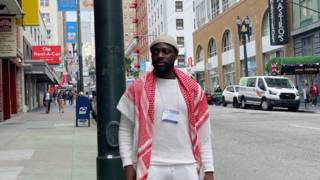
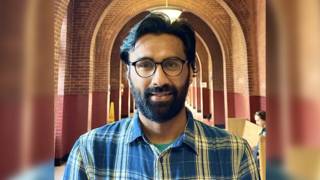
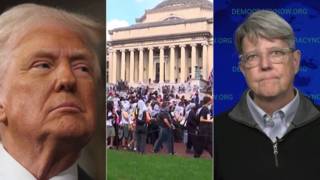
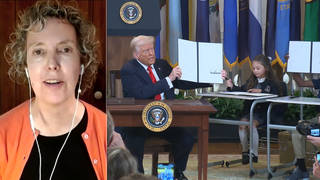





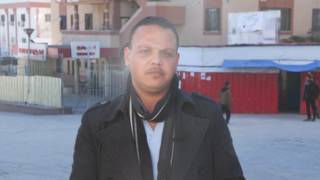
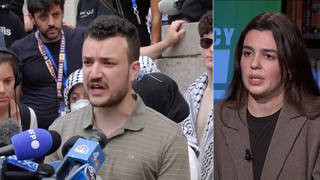
Media Options